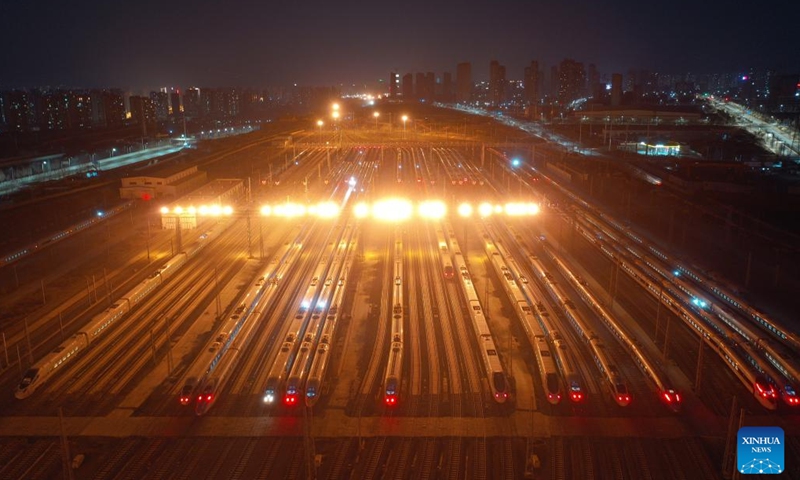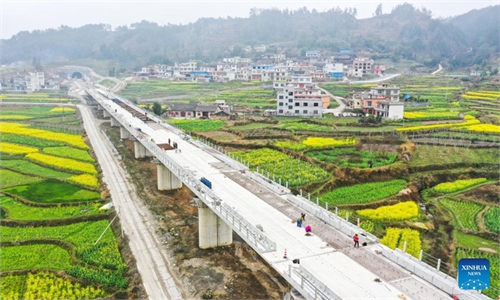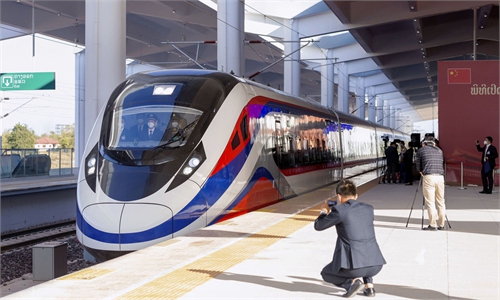China adjusts railway operations, boosts China-Europe freight service despite Ukraine crisis

Aerial photo taken on Jan. 16, 2022 shows the view of a maintenance base of Lanzhou West bullet train service station in Lanzhou, northwest China's Gansu Province. Staff members from Lanzhou West bullet train service station of Lanzhou section of China Railway Lanzhou Group Co., Ltd. carried out maintenance work for trains to prepare for the country's annual Spring Festival travel rush. Photo: Xinhua
China's national railway announced a shift to a new operating plan starting Friday, with an emphasis on boosting international freight and coal transport to serve the high level of opening up and foster the smooth functioning of the national economy.
The new plan will be implemented across the country on Friday, China State Railway Group said. It will optimize the operation of several railway lines, add international freight trains to increase coal transport capacity, the group said.
A number of freight trains will be added to the China-Europe freight service to facilitate transport capacity.
The Chengdu railway bureau will add three China-Europe freight train lines from Xinglongchang Railway Station in Southwest China's Chongqing Municipality, Guiyangnan Railway Station in Southwest China's Guizhou Province and Chengdubei Railway Station in Chengdu, Southwest China's Sichuan Province, which connect the Alashankou Port in Northwest China's Xinjiang Uygur Autonomous Region.
The adjustment conforms to the rising demand of China's foreign trade, the Global Times learned from the traders.
In the first quarter, China-Europe freight trains made 3,630 trips and sent 350,000 20-foot equivalent units (TEUs), up 7 percent and 9 percent, respectively, year-on-year.
Tommy Tan, president of Shanghai EPU Supply Chain Management, an agent of China-EU freight trains, attributed the growth to the rising demand from orders from Europe. The main categories of goods include auto parts, electronic products and products traded on cross-border e-commerce platforms.
"The newly added China-Europe freight train line is expected to strengthen the confidence of the market and offer more choices for customers to deliver their goods with wider railway coverage across the country," Tan said.
Despite the escalating crisis in Europe and resurgence of the COVID-19 in March, the impact on the China-Europe freight train service is limited.
Tan noted that the Ukraine tensions as well as the pandemic have tasked companies involved in international freight trading with new challenges, including prolonged cargo management procedures on COVID-19 prevention measures.
"However, the operations of the China-Europe freight train service were relatively smooth, and the demand for space was met," Tan added.
In addition to facilitating international logistics, the new railway plan is also aimed at optimizing and lifting coal transportation capacity for the domestic economy.
More transport capacity was added to facilitate the shipment of coal from major coal producing provinces to the rest of the country with optimized adjustment and added trains.
A total of 54 coal transiting cargo trains was added on the railway map on Friday to meet the demand of medium- and long-term contracts signed by Chinese coal suppliers.
Four 10,000-ton heavy duty trains have been added on Haolebaoji-Ji'an Railway which connects North China's Inner Mongolia Autonomous Region and East China's Jiangxi Province; fourteen trains were added from northwest China's Xinjiang Uygur Autonomous Region.
This represents the latest efforts by Chinese authorities to stabilize energy supply and to implement medium- and long-term contracts signed by Chinese coal suppliers which cover more than 80 percent of the resources they own, Lin Boqiang, director of the China Center for Energy Economics Research at Xiamen University, told the Global Times on Friday.
According to a notice issued by China's National Development and Reform Commission (NDRC) in March, all coal contracts signed should be recorded in the national coal trading center for online supervision, and the contracts' implementation needs to be reported online every month. No fabrication and "discounts" on implementation are allowed.
"The adjusted plan ensures that there will be sufficient transport capacity to deliver the coal mined in the medium- and long-term contracts. It is expected that the coal supply will be more stable this year," Lin said.
China's coal supply used to be curbed by the lack of transport capacity. However, the problem has been eased in recent years and the capacity should meet the demand, Lin added.
The prices of coal and other major commodities rose sharply last year, putting great pressure on people's needs for electricity and heating.
The railway sector has given full play to the potential of existing routes to ensure the stable transport of bulk commodities.
In the first quarter, the railway department delivered 350 million tons of coal, up 6.5 percent from a year earlier through the scientific allocation of resources.
China's railway cargo shipments reached 948 million tons in the first quarter, up 25.87 million tons year-on-year or 2.8 percent, higher than the target growth rate of 2.1 percent for the whole year.



